Huddled under the dim glow of a streetlight in a crowded Bengaluru slum, 12-year-old Nadia (name changed) sketched furiously on a piece of cardboard. Her family, forced to leave their drought-stricken village for a better life, struggled to make ends meet, leaving little room for luxuries like school supplies, let alone art materials.
Her parents migrated from Raichur, where farming remains a primary occupation despite the poor groundwater levels. “They earn just Rs 200 per day working in farmlands in Raichur due to poor yields. In Bengaluru, daily wage workers can earn up to Rs 800 to 1000,” shares Chenthil Kumar, the co-founder of Proud Indian — an organisation bringing empowerment to children through art.
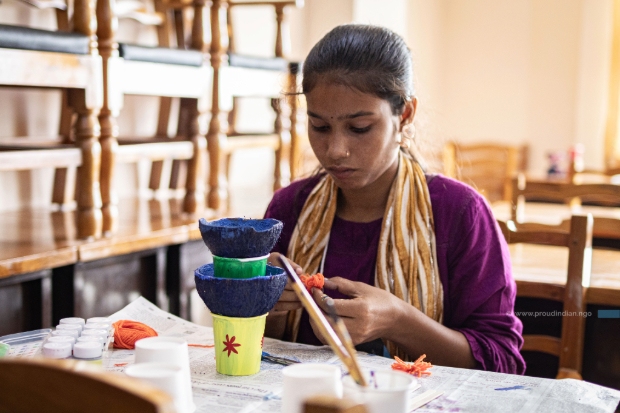
Nadia’s family — her parents and two siblings — call a tiny shed made of iron sheets home. For the five members, Nadia’s father struggles to make ends meet as an auto-driver. Her mother, a housewife, chips in by cooking food and taking care of the shed they live in.
Nadia loves to express herself through art — painting in particular. “Recently, I tried cake-based paint, and I made this beautiful sky with vibrant colours. You can see that painting on my wall,” she shares.
“The parents, unfortunately, don’t have the time to worry about their child’s education and passion towards art,” Chenthil says. “All that they can think about is how to ensure their child does not sleep hungry every day.”
Starting Proud Indian
Having spent his entire childhood in Tamil Nadu’s Kanyakumari, Chenthil was strongly affected by the 2004 tsunami.
“I could see people struggling to find food and accommodation, all while trying to process the grief of losing their family to the disaster,” he shares.
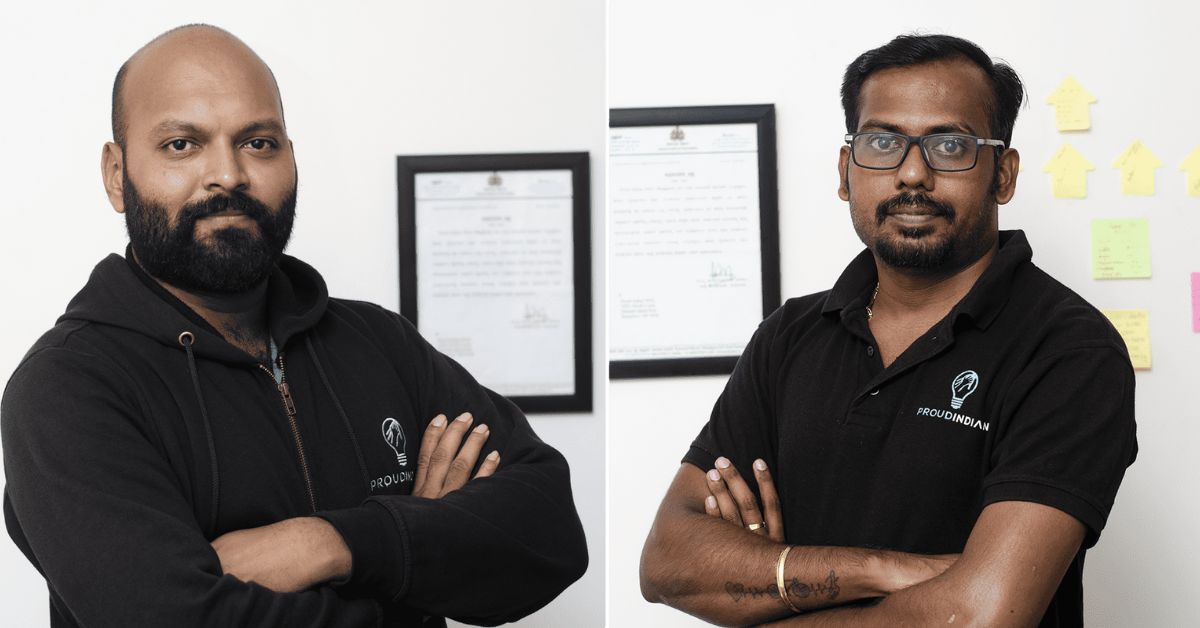
“Our family was able to provide relief measures for people in our locality and that, I believe, created an impact in my mind,” he adds.
Some years later, his academic pursuits in aeronautical engineering pushed him to move to Bengaluru. A humanitarian at heart, Chenthil continued to help those in need in little ways that he could.
In 2014, while providing relief to people, Chenthil met Sarjun H. “He was working actively as well,” Chenthil shares.
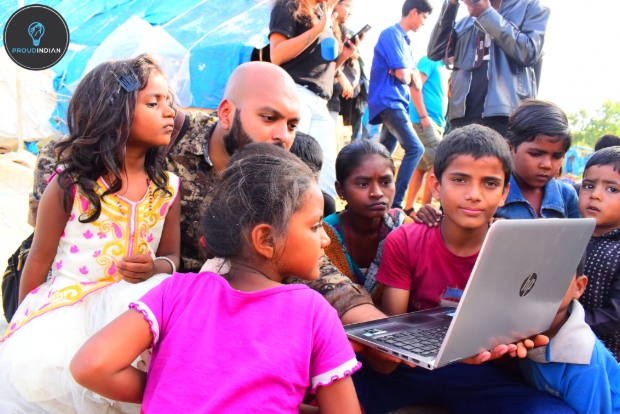
The two, both engineers by profession, soon got together and decided to look for ways in which they could contribute towards bettering the lives of children living in Bengaluru slums.
In 2019, they started Proud Indian with the aim of bringing education to all children who had limited access due to circumstantial obligations.
For the last five years, the NGO has been instrumental in providing facilities like food and education for thousands of children.
Introducing community schools
The child of a migrant worker faces a silent struggle — their right to education takes a toss as the parents focus on survival.
“Most of the parents do not take transfer certificates from previous schools before moving to another city. This hinders the opportunity of attending a government school for primary education,” Chenthil shares.
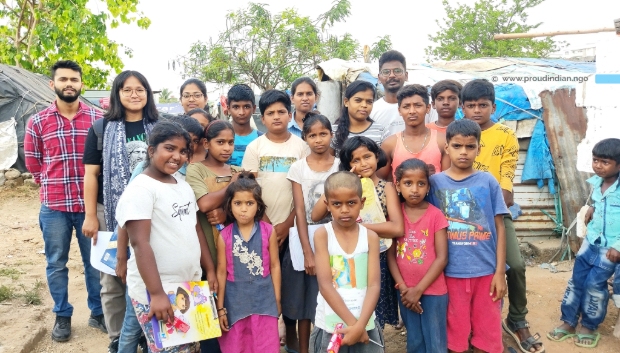
To fill the gap, Proud Indian, in association with other NGOs like Gubbachi Learning Community, Samriti, and Ruva, runs community schools for the children in Bengaluru every day. “The students are divided based on their age and learning capabilities, which is kept as S1 (read a sentence), S2 (read a word), and S3 (read an alphabet),” Chenthil explains.
“The community school acts as a ‘bridge course’ and helps the child pass at least 10th grade,” says Jinchu Mariam Sunny, who has been working in Gubbachi Learning Community. “We have been able to impact the lives of over 1,900 children.”
“The centres usually take two subjects and coach the child for a year so that they can pass those two subjects out of the five in their 10th grade,” explains Chenthil.
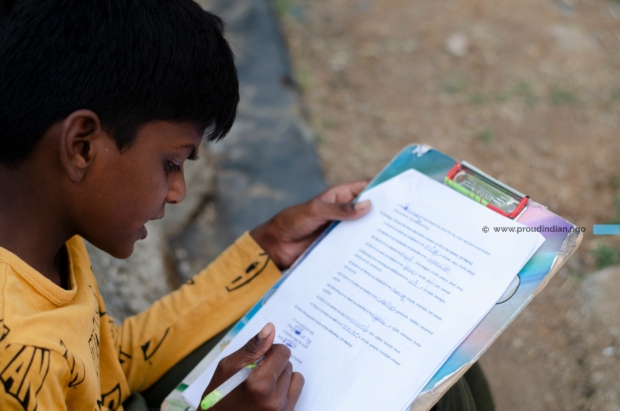
While this is a time-consuming process, it provides the guarantee that the child clears the exams over two to three years.
“We also provide spoken English classes over the weekend for these children in order to enhance their communication skills. And there is a significant improvement in their language,” Chenthil informs.
Exploring art
One of the main challenges for underserved children is that everything seems luxurious — from going to school to having three meals a day, Chenthil points out. In such a situation, art becomes the last thing that the child might aspire to.
“I did not like the concept of external factors deciding who can practise art,” says Chenthil.
In 2024, he and Sarjun decided to create a platform for all children to express their art, compete, learn from each other, and most importantly, keep their dreams alive.
“We wanted to show that art, while being a getaway for these children, can also help to sustain their livelihoods. Music, dance, and painting must be considered beyond its extra-curricular tag,” he shares.
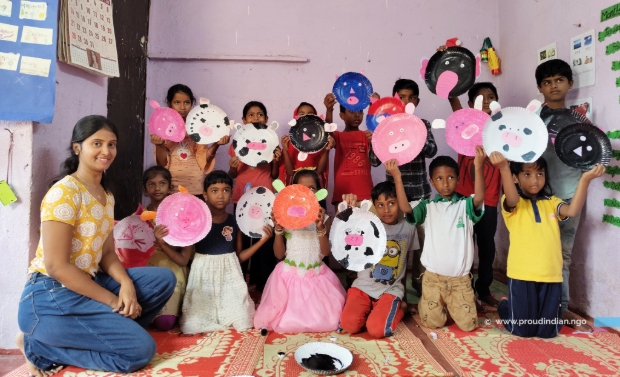
Through Proud Indian, the duo established Kalariti — a one-day event for the children to showcase art — in 2024.
The first Kalakriti saw over 280 students from multiple NGOs compete and secure prizes in dance, singing, rangoli, painting, and other related activities.
“The stage was huge. I was so happy when we won second place,” says 14-year-old Sameer (name changed), who participated in the group dance category with his friends.
“The main motive was to provide a platform for the child to express their talents and get the recognition they deserve,” shares Chenthil. But the initiative didn’t stop there.
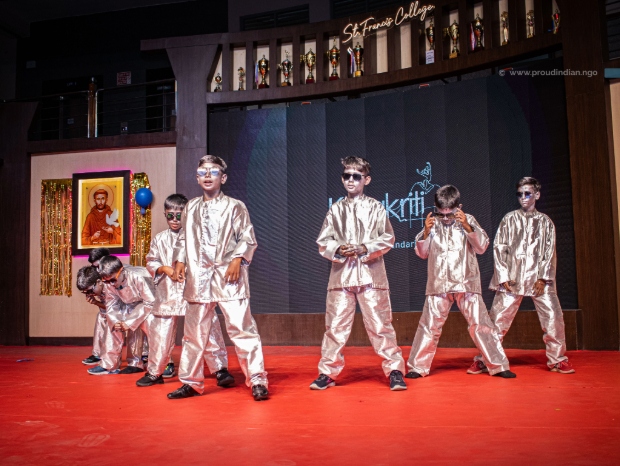
“We bring in professionals in each field, and provide training for the kids who have won in their respective competitions. We train them for a year, and after assessing their improvements and how quickly they learn, we equip them to participate in other open competitions,” Chenthil shares.
“Someday, I want to become a rap singer,” says Sameer, who hopes to participate in more competitions in the coming days.
Looking forward, Chenthil and Sarjun hope to impact the lives of thousands more children through accessible art and education, allowing them to keep their dreams alive.
Edited by Arunava Banerjee. All image credits Proud Indian NGO.
No comments:
Post a Comment